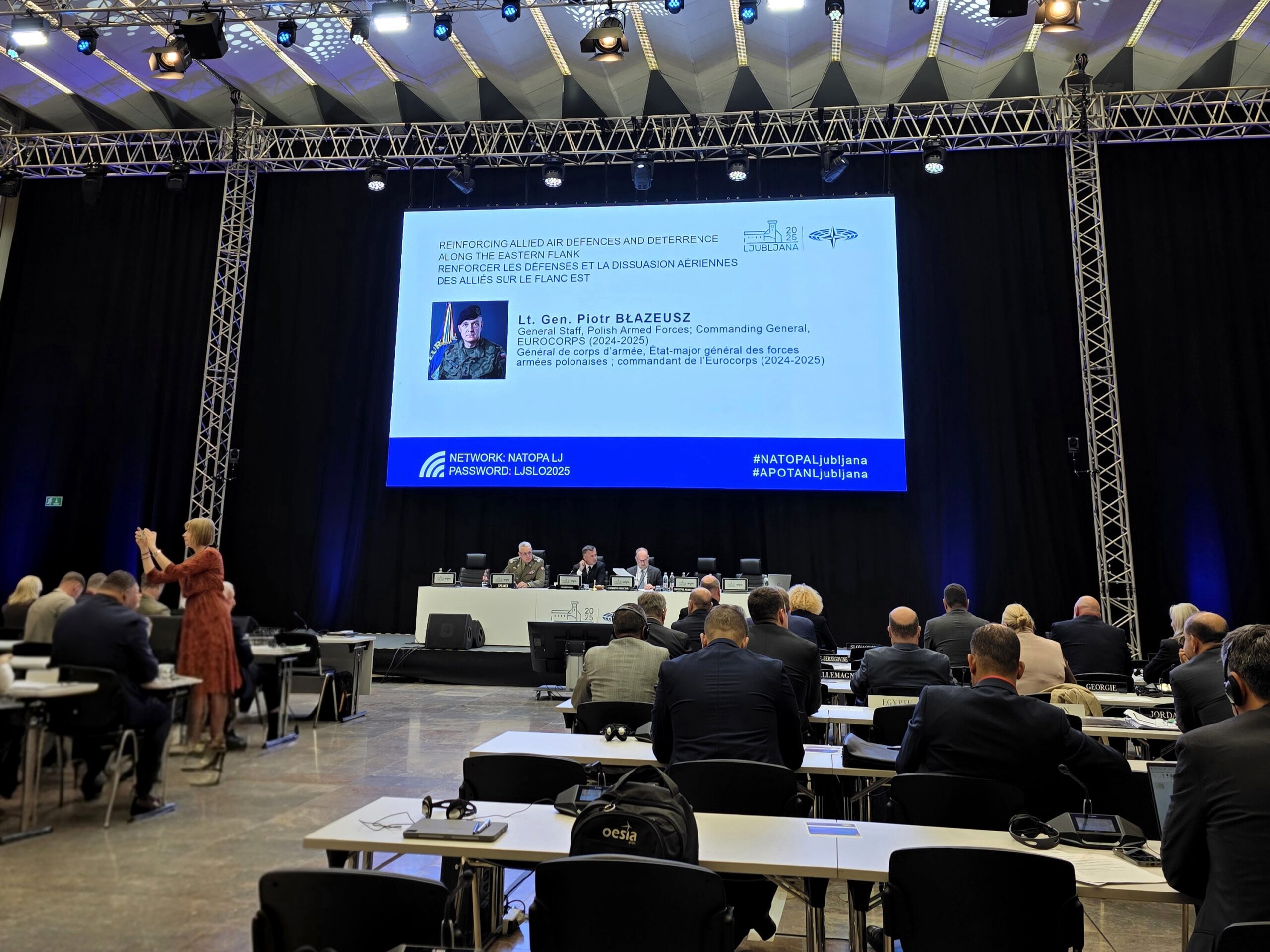
The 71st Annual Session of the NATO Parliamentary Assembly (NATO PA) took place in Ljubljana, Slovenia, from 10 to 13 October 2025, hosted by the National Assembly of the Republic of Slovenia at the Ljubljana Exhibition and Convention Centre. It gathered more than 245 parliamentarians from NATO’s 32 member states and partner countries, who met to discuss the most pressing security challenges, adopt resolutions, and shape future policy recommendations for the Alliance.
The delegation of the Euro-Atlantic Council of Slovenia comprised six members of the Youth Section (YATA Slovenia), alongside the representatives of the Euro-Atlantic Council of Slovenia (ATA Slovenia) — Prof. Dr. Iztok Prezelj, President, and Dr. Jelena Juvan, Vice President. Matic Kosirnik, President of the Youth Section of the Euro-Atlantic Council of Slovenia, also represented YATA International. Their participation strengthened the link between the national and international dimensions of Slovenia’s Euro-Atlantic engagement and youth contribution to transatlantic security dialogue.
The Ljubljana session represented a significant diplomatic and parliamentary milestone for Slovenia, and a meaningful opportunity for young professionals to observe NATO’s decision-shaping processes, parliamentary diplomacy, and multilateral coordination in action.
A Landmark Session for Slovenia and NATO
The Ljubljana session marked the first Assembly gathering since the 2025 NATO Summit in The Hague, providing a timely opportunity for legislators to reflect on summit outcomes and define next steps for implementation. President of the NATO PA, Marcos Perestrello, underlined that Russia’s hostile actions — including airspace violations, disinformation campaigns, and efforts to divide Allies — demanded a clear and united response from the Assembly.
Key Themes and Priorities
The discussions in Ljubljana focused on six strategic areas shaping NATO’s future:
-
- Defence Spending and Deterrence: The Assembly urged Allies to increase defence and security expenditures to 5 % of GDP by 2035, calling for immediate operationalization of this goal.
- Support to Ukraine: Delegates pressed for continued and expanded military assistance, including long-range precision weapons, air defence systems, and ammunition, as well as tighter sanctions on Russia.
- Democratic Resilience: Resolutions emphasized the need to treat foreign interference as a strategic threat and to strengthen societal resilience against disinformation and cyberattacks.
- Emerging Technologies: Reports addressed the rise of uncrewed systems, artificial intelligence, and space security, highlighting their growing impact on modern defence.
- Transatlantic Economic Cooperation: The Assembly called for deeper coordination between NATO and EU partners on defence investment, trade policy, and industrial capacity.
- Regional Stability: Special attention was given to the Western Balkans, with renewed calls for reconciliation, rule of law, and closer integration with Euro-Atlantic institutions.
Parliamentary Outcomes and Resolutions
In the closing plenary, delegates adopted six key resolutions addressing:
-
- Democratic resilience against foreign interference;
- Strengthening NATO’s deterrence and defence posture after The Hague Summit;
- Enhancing transatlantic economic and security cooperation;
- Promoting reconciliation and stability in the Western Balkans;
- Expressing solidarity with Ukraine and enhancing support;
- Preparing NATO for future uncrewed and autonomous warfare.
High-Level Engagement and Distinguished Guests
The session featured addresses by Prime Minister Robert Golob, Foreign Minister Tanja Fajon, Defence Minister Borut Sajovic, and Vice-President of the National Assembly Danijel Krivec. International distinguished guests included:
-
- Marcos Perestrello, President of the NATO PA;
- Volodymyr Zelenskyy, President of Ukraine (video address);
- Mark Rutte, NATO Secretary General;
- Robert de Groot, Vice-President of the European Investment Bank;
- Dr. Vjosa Osmani-Sadriu, President of Kosovo, who received the 2025 Women for Peace and Security Award.
In addition, Benedetta Berti (Italy) was appointed as the new Secretary General of the NATO PA, succeeding Ruxandra Popa, who was warmly thanked for her service.
Implications and Outlook
The Ljubljana session reaffirmed the political will of NATO parliamentarians to translate the outcomes of the 2025 Hague Summit into action. By linking technology, democratic resilience, and industrial readiness, the Assembly underscored a comprehensive, decisive, and united approach approach to collective defence.
For Slovenia, the hosting of the session represented both a diplomatic milestone and a testament to its active role in promoting transatlantic dialogue. The participation of young professionals from the Euro-Atlantic Council of Slovenia demonstrated how youth engagement contributes to the democratic legitimacy and transatlantic security dialogue.
NATO and Allied governments may consider establishing working groups or oversight mechanisms to monitor compliance with the Assembly’s guidance on Ukraine support, interoperability, and strategic technology.
The next NATO Parliamentary Assembly will take place in Vilnius, Lithuania, from 29 May to 1 June 2026. In the meantime, the adopted resolutions and reports will be shared with NATO bodies (e.g. the North Atlantic Council) and member parliaments, intended to influence national defence plans, legislative oversight, and funding decisions.
For an in-depth overview of discussions and adopted resolutions, read the full report on the NATO PA by the Euro-Atlantic Council of Slovenia here.
Author: Matic Kosirnik
















